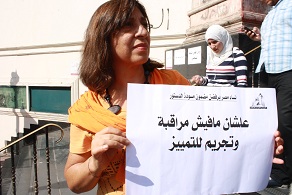By Rana Muhammad Taha
and Basil El-Dabh

(Daily News Egypt)
Opposition to the draft constitution continues to grow a day before the judiciary is to decide the future of the Constituent Assembly.
The National Council for Women (NCW) and former presidential candidate Abdel Moneim Aboul Fotouh’s Strong Egypt Party (SEP) both held press conferences voicing their grievances with the draft constitution on Monday. These groups were the latest of a series of voices expressing concern with what will be Egypt’s founding document.
The head of the NCW, Mervat Al-Tellawi, expressed the council’s disappointment with the draft constitution, listing various complaints.
The NCW had reservations regarding female representation in the Constituent Assembly, the lack of criteria for selecting the members of the assembly and the “loose” style of writing which makes the articles rather vague.
Regarding the contents of the draft, the NCW deplored the absence of a guarantee that international conventions are binding or that the state will enforce gender equality. They took issue with placing women’s rights in the context of Islamic Shari’a and making a religious institution like Al-Azhar party to the constitution. The council also criticised what they say as a lack of proper respect for the judiciary and the lack of reference to human trafficking.
Addressing gender equality, journalist Amina Shafiq criticised Al-Nour party spokesperson Nader Bakkar for saying in a TV interview that full gender equality would require approving female polygamy and equal inheritance rights. Shafiq contended that male polygamy is equally unacceptable, only to be shouted down by an audience member demanding to know why, if God allowed men to marry more than once, she should oppose it?
“Upon the formation of the Constituent Assembly, none of us were ambitious about the constitution it would draft, due to the basis upon which it was formed,” writer and feminist activist Fatheya Al-Assal said, pointing out that of the 100 assembly members, only seven are women, five of them are from the Muslim Brotherhood and see female genital mutilation as a “protection” for women.
Al-Assal argued that should the current Constituent Assembly be dissolved in Tuesday’s expected administrative court ruling, a new assembly should be formed not by president Mohamed Morsy but by the entire population.
“The Constituent Assembly is void,” Kefaya movement cofounder George Ishaq said. “Thus we refuse this draft constitution which fails to properly represent us. We need at least six months to discuss this constitution with the Egyptian people.”
Ishaq’s speech was interrupted by a heckler who questioned the value of the discussions given that slum-dwellers like himself were currently reduced to eating rubbish.
At their press conference, the SEP released a 31-page report outlining their issues with many of the articles of the draft, ranging from ones outlining presidential powers to those that address human rights and personal freedoms.
The document quotes many articles of the draft and provides the SEP’s position on each of them. The party asserted that Egypt’s next constitution should represent “the revolution and its goals.” The report lists social and economic rights, the rights of workers, the welfare of Egyptian farmers, the restriction of presidential powers in cases of necessity and emergency, equality in recruitment among the youth for different levels of education, the curtailing of legislation that violate rights and freedoms, more cautious application of harsh sentencing, physical abuse policy reforms, the empowering of trade unions, guarantees for workers’ right to strike and freedom of the press.
The party also pressed for protecting the rights of women, people with disabilities and children.
SEP member Ahmed Imam said his party could not support the draft, as it did not prioritise the development of the country and its citizens, claiming that many of the provisions were similar to the 1971 Constitution. He pointed to powers allotted to the president that had remained unchanged with regards to appointing the heads of important state institutions. Members of the party warned that the existence of an upper legislative house as mentioned in the new constitution was contrary to the consensus to completely cancel it.
Aboul Fotouh’s party also objected to the authority given to Al-Azhar over Islamic law, saying it believed that Al-Azhar should only play a consultative role.
On Sunday Al-Dostour Party called on all political factions in Egypt to unite and develop criteria to form a new Constituent Assembly in an effort to promote consensus that it claims does not currently exist in the assembly or President Mohamed Morsy’s administration.
A large group of progressive and leftist parties staged demonstrations against the constitution on 12 and 19 October. Groups that have voiced disapproval over the draft include Al-Dostour Party, the Popular Current, the Revolutionary Democratic Coalition, the Free Egyptians Party, 6 April Youth Movement. The groups claim that the current Constituent Assembly does not accurately reflect society and has been dominated by the ideologies of the Muslim Brotherhood and other Islamist currents.
Some Salafi parties have also expressed disdain for the draft constitution, especially the wording of Article 2, which ultraconservative Islamists have argued should call for “provisions” of Islamic law, rather than “principles” as is currently stated.
The Administrative Judiciary Court decides the fate of the assembly on Tuesday. If the current Constituent Assembly is dissolved by the court, President Morsy will be responsible for forming what would be Egypt’s third attempt at creating a body to draft the constitution.

